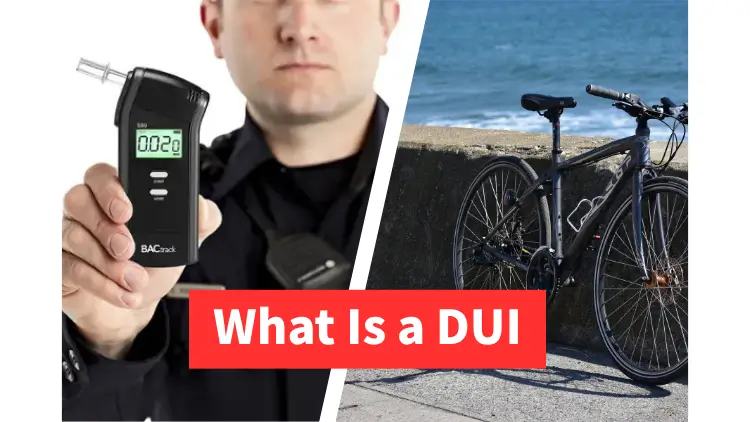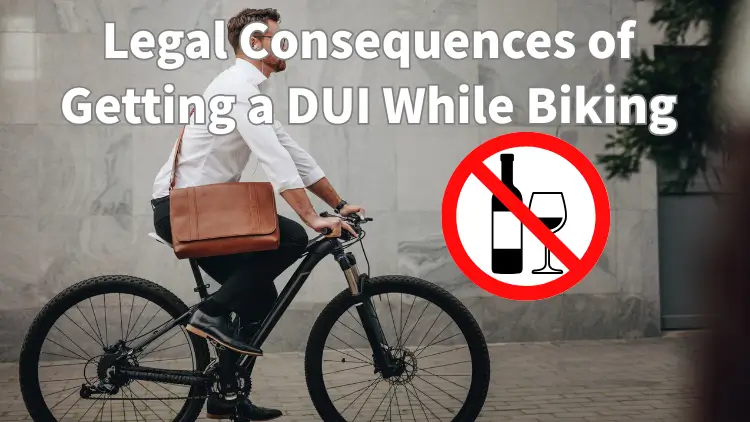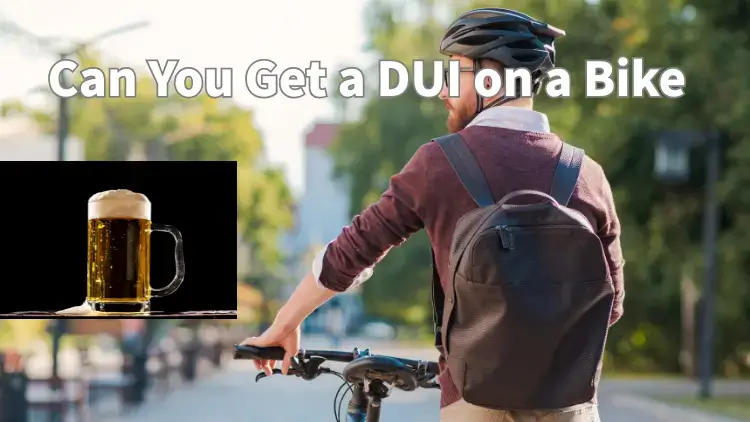Can You Get a DUI on a Bike?
When we hear the term “DUI” (Driving Under the Influence), most people picture someone being pulled over by the police after drinking and driving a car. But what if you’ve been drinking and decide to ride your bike home? Can you get a DUI on a bike? The answer might surprise you: In many places, riding a bicycle under the influence can still lead to DUI charges.
Depending on the laws in different countries and regions, bicycles are considered “vehicles” in some jurisdictions. This means that riding while impaired by alcohol or drugs could result in penalties similar to those for drunk driving a motor vehicle, including fines, license suspension, and even jail time. That’s why it’s important to understand whether you can get a DUI on a bicycle.
Next, we’ll explore how DUI laws apply to cyclists, highlight key differences across various states, and explain what you need to know before riding after drinking, helping you avoid the serious consequences of a DUI on a bike.
What Is a DUI? Drunk Driving and Blood Alcohol Concentration (BAC)

A DUI, or Driving Under the Influence, refers to operating a vehicle while impaired by alcohol or drugs. In most U.S. states, a person is considered legally intoxicated if their blood alcohol concentration (BAC) is at or above 0.08%.
However, the critical issue lies in how the term “vehicle” is defined under the law. Different states interpret “vehicle” in varying ways—some include bicycles, while others limit the definition strictly to motorized vehicles.
The core of a DUI offense isn’t just the BAC level; it’s about whether someone is operating a mode of transportation in a way that could endanger public safety while under the influence. Whether a bicycle falls under DUI laws depends entirely on each state’s statutory language and how the law is enforced. In some jurisdictions, riding a bicycle while intoxicated can carry nearly the same legal consequences as driving a car under the influence.
Are Bicycles Considered Vehicles Under DUI Laws?
Whether a bicycle is classified as a “vehicle” for DUI laws varies significantly by state.
For example, in California, Section 23140 of the Vehicle Code clearly states that riding a bicycle under the influence of alcohol qualifies as a DUI offense. If a cyclist’s BAC exceeds the legal limit while riding, they can face legal penalties (California Legislative Information, 2023).
In contrast, Florida’s DUI statute (§316.193 of the Florida Statutes) applies only to motor vehicles and does not explicitly include bicycles. However, intoxicated cyclists in Florida may still face other charges, such as public intoxication or reckless behavior (Florida Legislature, 2024).
Overall, many states adopt a broad interpretation of what it means to operate a “vehicle” or “means of transportation,” which may include bicycles, e-scooters, or similar non-motorized forms of travel. The applicability of DUI charges to cyclists ultimately depends on local statutes and how they are interpreted by law enforcement and courts.
So, what states can you get a DUI on a bike? The answer depends entirely on regional legislation and the discretion of the courts.
Related reading: Are Electric Bikes Legal?
State-by-State Differences: Where Can You Get a DUI for Biking Under the Influence?
In the United States, DUI (Driving Under the Influence) laws are determined individually by each state, resulting in no nationwide consistency. This means that while riding a bicycle under the influence may be prosecuted as a DUI in one state, it might not be in another. The key factor lies in how each state defines a “vehicle” and what constitutes “operating” it.
Legal interpretations vary widely, but most states fall into one of the following three categories. One such category includes states that explicitly allow DUI charges for riding a bicycle under the influence:
States That Include Bicycles in DUI Statutes:
In these states, the law specifically states that bicycles fall under the definition of vehicles for DUI purposes. Therefore, even riding a non-motorized bike on public roads while intoxicated can lead to DUI charges similar to those for drunk driving a car. Examples include:
- California
- Colorado
- Ohio
- South Dakota
- North Dakota
So, can you get dui on a bike in these places? Absolutely. In these states, cycling while intoxicated is treated seriously and may result in fines, criminal records, or license implications, just like a DUI in a car.
States Where the Law Is Unclear and Depends on Circumstances
Some states do not explicitly state whether DUI laws apply to bicycles. However, based on local law enforcement practices or individual court rulings, riding a bicycle under the influence may still lead to legal consequences. In these jurisdictions, while you may not be formally charged with a DUI on a bike, you could still face penalties through alternative legal avenues, such as:
- Being charged with disorderly conduct or reckless behavior
- Receiving a citation, fine, or even temporary detainment
Representative examples of such states include:
- New York
- Texas
- Pennsylvania
In these states, can you get a DUI on a bicycle? Technically, it’s uncertain—but that doesn’t mean there are no consequences. Riders should be cautious, as legal interpretation can vary by county or even individual officer discretion.
States Where DUI Laws Do Not Apply to Bicycles
There are also states where DUI statutes explicitly apply only to motor vehicles, meaning you cannot be charged with a DUI on a bike under standard DUI laws. However, this does not grant free rein to ride a bicycle while intoxicated—law enforcement may still issue citations under other applicable regulations.
Examples of such states include:
- Florida
- North Carolina
- Louisiana
Reminder: Even in states where DUI on a bicycle charges are not applicable, riding a bike under the influence still poses serious safety risks and could result in citations for public intoxication or endangerment. It’s strongly advised to avoid cycling after consuming alcohol or drugs.
Legal Consequences of Getting a DUI While Biking

While many assume that DUI (Driving Under the Influence) laws only apply to motor vehicle operators, in several U.S. states, individuals can face similar consequences for operating a bicycle while intoxicated. If you’re wondering, can you get a DUI on a bike? The answer is yes—in some jurisdictions, the penalties can be just as serious as those for drunk driving a car. Legal consequences may include criminal charges, financial penalties, and long-term impacts on daily life.
Related reading:
- How long does it take to bike 10 miles
- What Country Is Most Bike Friendly in 2025?
- Do You Need a License For an Electric Bike
- How Fast Can a 125cc Dirt Bike Go
- How Fast Can an Electric Bike Go
Here are the key legal outcomes one might face:
1. Criminal Penalties: Fines, Jail Time, or Probation
In most states, DUI is classified as a misdemeanor. Even when committed on a bicycle, it may lead to:
- Fines ranging from $100 to $1,000 for a first offense
- Possible jail time of up to 6 to 12 months, depending on state laws and the specifics of the case
- Probation, mandatory community service, or enrollment in alcohol education programs
In cases where the intoxicated cycling results in an accident or injury, charges can escalate to a felony, leading to harsher sentencing.
2. Impact on Driving Privileges
Even if the DUI occurs while riding a bicycle, some states, such as California and Colorado, may:
- Suspend or revoke your driver’s license
- Increase future car insurance premiums, as the offender is considered a high-risk driver
- Require the installation of an Ignition Interlock Device (IID) before reinstating driving privileges in severe cases
3. Permanent Criminal Record
A DUI conviction becomes part of your criminal record and can:
- Affect future employment opportunities
- Complicated immigration status or applications
- Impact professional licenses (e.g., for lawyers, medical professionals, educators)
- Disqualify individuals from certain roles in public service, security, or commercial driving
4. Mandatory Courses and Behavioral Interventions
Courts often order those convicted of DUI while biking to complete:
- Alcohol or drug abuse evaluations
- Counseling or behavioral therapy
- A specific number of hours in community service programs (such as street cleaning or volunteer work)
These obligations can disrupt both personal and professional life.
5. Civil Liability Risks
If biking under the influence leads to an accident, injury, or property damage, consequences may extend beyond criminal court:
- You may be sued for civil damages
- Insurance companies may deny claims
- Victim compensation could far exceed standard DUI fines
In short, while the question you can get a DUI on a bike may seem surprising, the legal and financial consequences in some states mirror those of motor vehicle DUIs. Beyond fines or mandatory programs, a conviction can leave lasting effects on reputation, finances, and future opportunities.
Real Case Analysis
Case 1: California – Cyclist Officially Arrested and Fined for Biking Under the Influence
State: California
Summary: A man in Los Angeles was stopped by police after swerving across multiple lanes and refusing to pull over while riding his bicycle. His blood alcohol concentration (BAC) measured 0.12%. He was charged under California Vehicle Code §21200.5 for Bicycling Under the Influence (BUI).
Outcome: The cyclist was fined $250 and required to complete an alcohol education program. While the incident did not result in a formal DUI criminal record, it was still treated as a criminal offense.
Takeaway: In California, bicycles are considered vehicles under the law, and BUI is handled similarly to DUI, particularly in urban areas or during nighttime riding, where the risk of enforcement increases.
Case 2: Colorado – Cyclist Charged with Felony DUI After Hitting a Pedestrian
State: Colorado
Summary: A man riding a bicycle at high speed on a sidewalk while intoxicated collided with a pedestrian, causing minor injuries. His BAC at the scene was recorded at 0.16%. Despite using a non-motorized vehicle, he was prosecuted under Colorado Revised Statutes §42-4-1301 for DUI.
Outcome: He was convicted of a first-time DUI, sentenced to 10 days in jail, fined, ordered to complete community service, and temporarily had his driver’s license suspended.
Takeaway: In Colorado, cyclists fall fully within the scope of DUI laws. Even without major damage or injury, intoxicated cycling can lead to criminal charges and significant penalties.
Case 3: Oregon – No DUI Charge, but Still Penalized
State: Oregon
Summary: A woman riding her bicycle at night in Portland while intoxicated was stopped by police after losing control of the bike. Although she was not charged with DUI, she was cited for public intoxication and disorderly conduct.
Outcome: She avoided a DUI conviction but was fined and required to attend a substance abuse evaluation program.
Takeaway: Even in states where DUI statutes do not explicitly apply to bicycles, law enforcement can still penalize intoxicated riders under related legal provisions. The consequences may be less severe than DUI, but are by no means negligible.
Best Bike Components:
Know the Rules Before You Ride
- Significant Differences in State Laws:
Some states, such as California and Colorado, explicitly state that riding a bicycle while intoxicated can result in a DUI charge. In contrast, other states like Minnesota and South Dakota do not apply DUI statutes to non-motorized vehicles. - Inconsistent Definitions of “Vehicle”:
The legal definition of “vehicle” varies across states. In some, bicycles are considered vehicles and subject to traffic laws accordingly, while others limit the definition to motorized vehicles only. - BAC Limits Still Apply:
Most states continue to use a 0.08% blood alcohol concentration (BAC) threshold as the legal limit for intoxication. This standard may also apply to DUI cases involving bicycles. - Stricter Enforcement at Night and in Urban Areas:
Police patrols are more frequent in city centers and at night. Riding behavior that appears erratic or unsafe is more likely to draw police attention in these settings. - High Risk of Penalties Even Without a DUI Charge:
Even if you’re not formally charged with a DUI, you may still face fines or legal consequences for obstructing traffic, unsafe operation, or public intoxication. - Consider Alternative Transportation:
To avoid unnecessary legal risk, opt for safer alternatives like Uber, public transit, a sober friend, or simply leave your bike and walk home.
Appealing a Wrongful DUI Charge While Biking
If you are wrongfully charged with a DUI for riding a bicycle while intoxicated, the first step is to preserve all relevant evidence—this includes the results of any alcohol tests, as well as video or audio recordings of the law enforcement encounter. Next, consult a lawyer with experience in DUI defense as soon as possible to understand how DUI laws are defined in your state and whether they apply to bicycles.
Many states do not include bicycles under their DUI statutes, which could provide a strong legal basis for defense.
In addition, you may request that the prosecution review the legitimacy of the charges, particularly whether the enforcement procedures followed proper legal protocols. If there are procedural flaws or if the bicycle falls outside the legal scope of DUI laws, you may have grounds to seek a dismissal or reduction of the charges. Referencing relevant case law or legal precedents can also improve the likelihood of a successful appeal.
In summary, when facing a DUI charge for biking under the influence, it is crucial to take prompt legal action to protect your rights and avoid unnecessary legal consequences.
FAQ
Can I lose my driver’s license for DUI on a bike?
Yes, in some states.
Even though you are not operating a motor vehicle, certain states (such as Colorado and California) treat Biking Under the Influence (BUI) similarly to a DUI. In these states, a BUI can result in suspension or revocation of your driver’s license, especially if the court treats it as a criminal offense under their DUI statutes.
In other states, biking DUI may not directly affect your driver’s license, but it can still come with other criminal or administrative penalties.
Does a bike DUI go on your criminal record?
It depends on the state and how the offense is charged.
In some jurisdictions, a BUI is processed under the same criminal code as a DUI, meaning it can show up on your criminal record, even if it’s a misdemeanor. For example:
In California, BUI under Vehicle Code §21200.5 is a misdemeanor that does not count as a prior DUI, but it still creates a criminal record.
In Oregon, a drunk bicyclist might not be charged with DUI but could still face charges like public intoxication or disorderly conduct, which also go on record.
If you’re charged, it’s strongly recommended to consult a lawyer to explore record expungement options, especially if this is your first offense.
What’s the legal BAC limit for biking?
Generally, 0.08% BAC.
In most states that apply DUI laws to bicyclists, the same Blood Alcohol Concentration (BAC) limit of 0.08% applies, just as it does for motor vehicles.
However, in states where BUI is treated as a separate offense (like in California), the law doesn’t always define a strict BAC threshold, and any level of impairment that affects your ability to ride safely may be enough for an arrest.
Can I be breathalyzed while on a bicycle?
Yes.
Police officers can legally administer a breathalyzer test if they suspect you are under the influence while biking. Refusing to take the test may not trigger the same penalties as refusing during a car DUI (like automatic license suspension), but it could still be used against you in court depending on the state.
Some states do not have implied consent laws for bicycles, meaning you might not be legally required to submit—but refusal can still raise suspicion or result in non-DUI charges, such as obstructing an officer or disorderly conduct.











